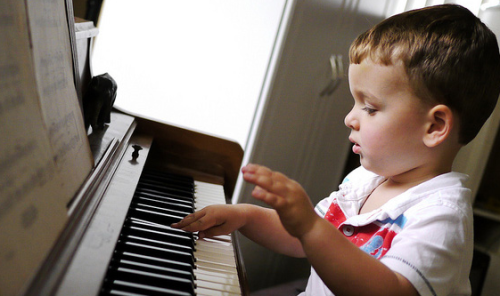Music is a part of life for many people. It provides the soundtrack to our lives, reflecting our moods and passions. Because of its ability to provoke emotion, music is included in movies, television shows, and even commercials to help set the mood for a scene. But the effect of music goes far beyond these superficial elements.

For years, educators have been stressing the importance of music from early developmental stages. Mothers are even encouraged to play music for children in the womb. The lasting effects of music’s beneficial properties can be seen in children as young as two and well into adulthood.
Studies showing benefits of music in child development
Music appreciation is just the tip of the iceberg. Several studies have found that active participation in music, typically through education and playing an instrument, has proven to show positive effects in individuals of all ages. In a survey conducted by The Gemeinhardt Company in the 80s, parents of band students felt the class was more of an educational experience rather than an extra-curricular activity.
More recent studies have supported the Gemeinhardt study. Scientists have found that music education contributes to higher usage of the left side of the brain. Brain mapping has shown that individuals who study music not only use more of their brain but have an increase in neurological pathways. E. Glenn Schellenberg at the University of Toronto at Mississauga conducted a study that found a small increase in intelligence quotient (IQ) in six year olds who took weekly piano or choir lessons. In the nine month study, scientists found that the musical children showed IQs increased by three points compared to the control group.
Other benefits
Children have also been shown to show an increase in fine motor skills and sound discrimination, leading to improved language and reading abilities. Children are able to decode words and sounds better, which in turn allows them to develop their basic skills faster. By studying music, children are able to distinguish pitch, timing, and timbre which in turn allows them to improve their linguistic abilities. Since music also enhances the ability to learn new subjects, children are often taught through song, which also appeals to them. Spatial-temporal skills, similar to those utilized while completing math problems, have also been known to show improvement through the implementation of music.
Music has also proven to be beneficial for children’s self esteem. Children who participate in musical activities have proven to demonstrate higher levels of confidence. Music also allows them to express themselves, sometimes relieving anxiety or stress over situations. Many behavioral health facilities have implemented music programs because of its therapeutic properties. Music has also been able to substantially improve creativity in artistic activities and problem solving.
Music lessons should be encouraged at any age. If taught from a young age, learning an instrument can improve a child’s dexterity as well. Individuals of all ages are able to learn all elements of music, including reading sheet music, through practice and instruction which is often available through school programs. Sites like www.jamplay.com offer alternatives for students who seek additional assistance or whose school may not have a music program.
Impressively, music has the ability to not only improve an individual’s mental state, but also their physical state. While some schools are seeing a decrease in funding for music programs, many schools are able to find means to facilitate the programs. Even preschools are allocating funding for music education programs. Through increased understanding of music and it’s effects, parents and educators are finding music education to be increasingly important.
at 12:01 AM
Aaron, this was an informative article about music and child development. I had no idea that listening to music can contribute to higher usage of the left side of the brain. I will have to make sure my kids listen to music!